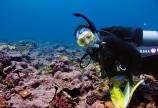Marine ecologist’s global impact earns national award
- Vimala Jeevanandam

Marine biologist Julia Baum is one of six university faculty members across the country to be awarded a coveted 2018 E.W.R. Steacie Memorial Fellowship from the Natural Sciences and Engineering Research Council of Canada. The fellowship honours “outstanding and highly promising faculty who are earning a strong international reputation for original research.” It includes a research grant of $250,000 over two years.
“Julia is an inspired choice and an inspirational recipient of this award,” says co-nominator Verena Tunnicliffe, also an internationally respected marine biologist at UVic, and the Canada Research Chair in Deep Ocean Research. “She’s the epitome of the scientist who acknowledges, and who acts upon, the responsibility to contribute one’s expertise beyond academia.”
Baum studies how human disturbances alter the structure and dynamics of marine ecosystems and the consequences of those changes. Her research on the effects of exploitation on sharks provided the first robust evidence that overfishing had caused dramatic declines in the world’s shark populations.
Baum’s research at UVic uses complex statistical analyses and intensive fieldwork to study how fishing and climate change are impacting tropical coral reefs, the most diverse of marine ecosystems. Her work on Kiritimati Island (Christmas Island) in the equatorial Pacific attracted attention when the recent major El Niño event caused the worst heat stress ever recorded on the island’s corals, resulting in widespread bleaching and coral mortality.
The data she’s collecting there is helping researchers around the world evaluate the resilience of coral ecosystems to globally rising temperatures.
Only 10 years after completing her PhD, Baum has already earned more than 20 fellowships and awards; published almost 50 peer-reviewed articles, five of them in Science, one of the top two science journals in the world; and been cited more than 7,000 times—an exceptional record for someone so early in their career.
Baum is also a much-sought-after speaker by the world’s top universities, a passionate advocate for women in science, and an articulate and persuasive science communicator.
“I want the science that my team and I do to matter. We devote a lot of effort to sharing our work with the public, school kids and policymakers— it’s the right thing to do and we love doing it,” says Baum of her motivation to effect change through research and communicating publicly about changing environmental conditions to inform public discourse and policy-makers.
Baum will use her fellowship grant to expand her research at Kiritimati to better understand the factors that influence coral reef recovery following mass mortality events.
“It’s an incredible honour,” says Baum of being awarded a Steacie Fellowship. “Coral reefs are one of the most sensitive ecosystems to climate change, and the discoveries the scientific community makes in the next few years—along with the decisions that we make as a society about addressing climate change—are going to dictate if these ecosystems can persist throughout this century.
“I’m incredibly grateful to NSERC for this support. It enables me and my team to take our research to the next level and to push the boundaries of what’s known about coral reef resilience to climate change.”
Baum is the 10th UVic researcher to be awarded a Steacie Fellowship. Baum is featured in a university produced video.


